This Year's Parsons Grads Plan to Harness All Things Digital
From planning collections based around social networks to making fiber from money, these grads are looking to the future to make fashion a better place.
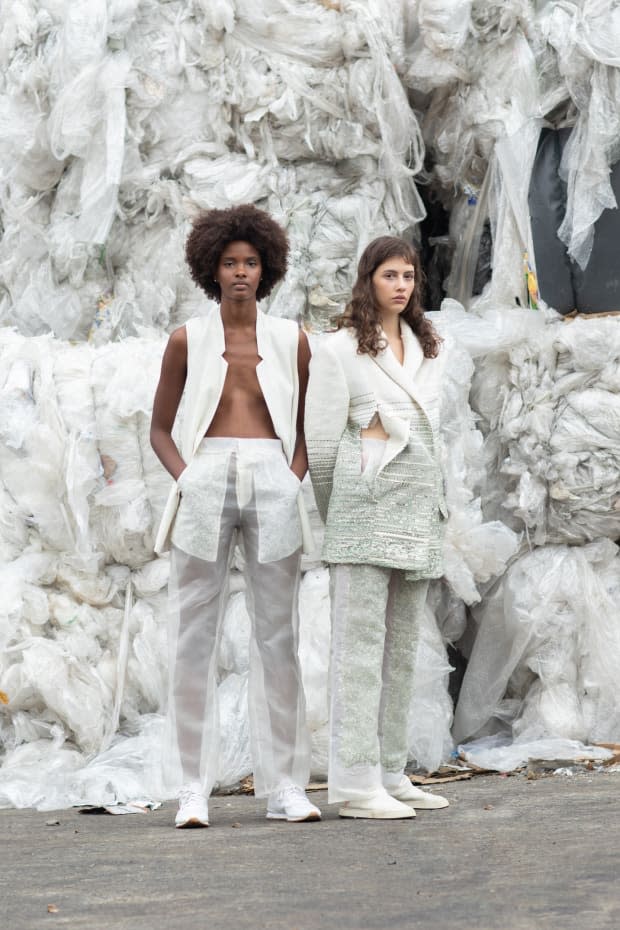
Each year in May, Parsons School of Design in New York City hosts its annual benefit and runway show featuring select talent from the graduating fashion design class, gathering together prominent figures in the industry as well as the occasional celeb, like Rihanna, who was honored in 2017.
This year's event, which took place Monday, May 20, was no different, featuring a lineup including rapper, songwriter, entrepreneur and Chanel collaborator Pharrell Williams; Julie Wainwright, founder and CEO of The RealReal; Katrina Lake, founder and CEO of Stitch Fix; and Michael Preysman, founder and CEO of Everlane. That three of the four honorees are all CEOs of digital-first companies suggests digital really is the future of fashion.
As it would happen, some of the star students presenting during the runway show have a similar mindset. Here, five standouts talk about using the internet to propel their fashion concepts forward, how they're implementing different aspects of sustainability and what's next for them.
Josefina Munoz
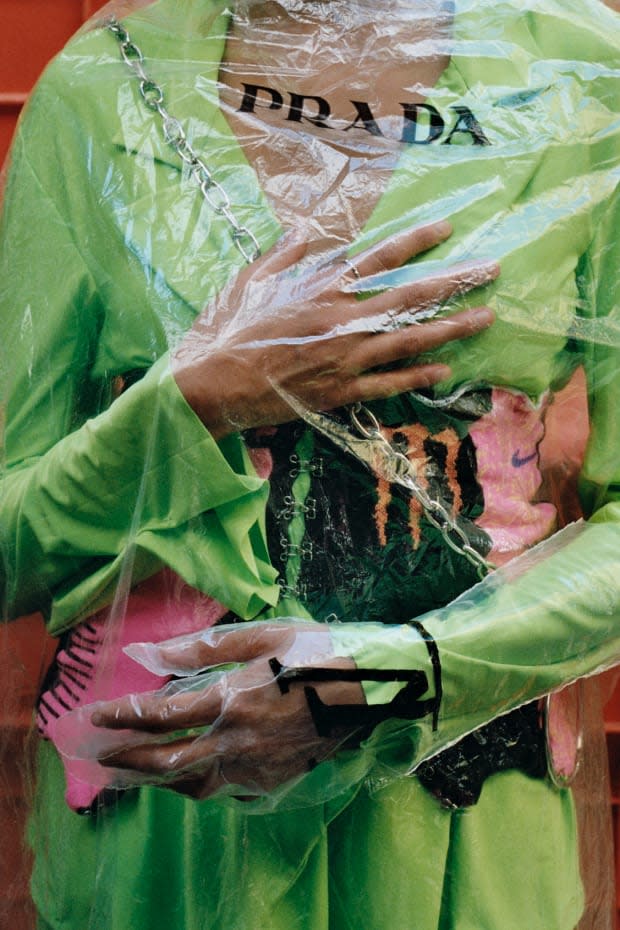
Josefina Munoz created not just a collection, but an entire online marketplace where anyone can donate and access materials to develop fashion or design objects. Knock-off luxury plastic bags from the Tepito market in Mexico, umbrellas, authentically branded bags from actual luxury stores like Gucci, luxury garment bags donated from a system of people around the world and chicken bones from communal eating sessions she hosts are just a few of the items that can be purchased. She titled her project "No Me Copies" with the goal of democratizing fashion through the questioning of authenticity, exploring knock-offs and luxury culture.
"'No Me Copies' begins with knock-off markets and the overall knock-off effect that allows the product to reach populations that generally can't afford the original," Munoz explains. "The costs to the rightful owner are intangible, the pirates have taken something you own, they have reproduced something you own, so you don't suffer a loss but rather a lesser gain."
On her Instagram account, she showcases some of the examples of items she's made using the aforementioned marketplace materials, such as pants and dresses constructed out of Chanel garment bags or Adidas shopping bags. "I've tried to show the spirit of these markets through an Instagram account that mixes both high-end fashion staples as well as knock-offs in its varying forms, and everything in between, just as I have done in my thesis," she says. She plans on continuing her project post-graduation. "I plan on continuing 'No Me Copies' as a movement by doing more workshops around the world, as well as setting a manifesto and instructions for others to replicate these workshops."
Emma Yates
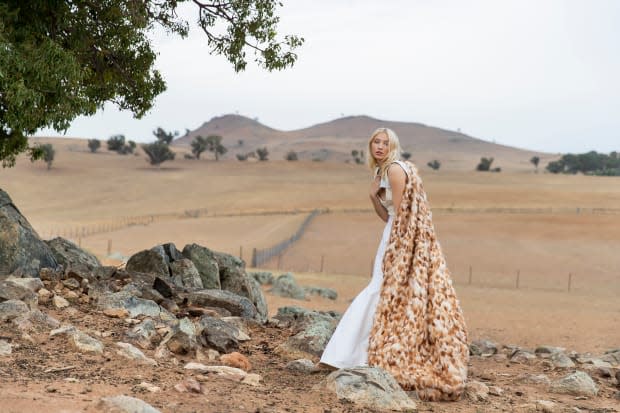
Australian student Emma Yates focused her thesis on creating a bridalwear line using all Australian products, which she sourced by working directly with local farmers she's known since her childhood. Her garments also put a major emphasis on sustainability: She worked directly with her neighbor in Australia, Richard Hyles, to source her wool, then processed it in Victoria, Australia. "This small batch, direct sourcing, allows me access to the best quality wool in the world, and allows my customer to connect with the land and the fiber," says Yates. "Every lining is 100% silk, it was all sewn with silk thread. I used wood and wool-felt beads and buttons, as well as sheep, cow and kangaroo leather and fur, sourced local to these NSW [New South Wales] farms."
"While I spent a lot of time on the ground in Australia sourcing, technology allowed me to connect with the people at home (10,000 miles away) working behind the scenes on my fiber production," she explains. "It also allowed the farmers to connect with my final outcomes of this collection, which is something not typically done in this industry. In fact, my neighbor Richard had never seen a final outcome of his hard work farming his merino sheep, as he traditionally sells the fiber in its greasy state."
Pushing the boundaries of what modern bridal clothing can be, many of her pieces are also designed to be worn after the wedding day, and all pieces are biodegradable. After graduation, she plans to continue to expand her bridal concepts.
Jaadi Nogueira Fonseca
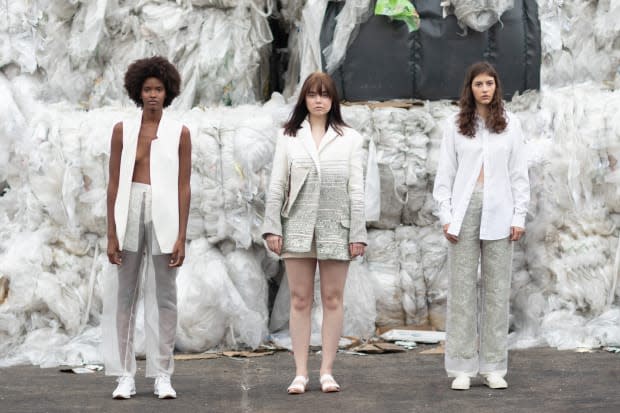
Imagine fashion textiles made entirely out of money. That's exactly what Jaadi Nogueira Fonseca has created for her final thesis. The idea behind her project is to create a movement for people to reimagine value systems. "I would say that the main source of inspiration for me is social and environmental issues that are affected by or affect the fashion industry while impacting a great number of people," says Fonseca.
"At the beginning of my project, I used technology to visualize the research I have been doing with more than one hundred people. After asking them 'What would you save if your house was on fire?' I generated a large amount of qualitative data and used technology to visualize some patterns of: what are the values that people are most impacted by in reference to Holbrook's typology of value?" Fonseca explains. "After talking to people all over the globe, I came to understand that this project needed to have a life of its own, allowing people to plug in with the ideas and thoughts on how value should influence us."
Fonseca now runs the Instagram account @_showmeyourpapers as a platform for people from around the world to talk about these subjects. Post-graduation, Fonseca plans to work on projects or with companies that are primarily mission-driven. "I would like to work on projects or with companies that understand that anything that is being put out in the world needs to be justified. We can no longer afford to produce things mindlessly."
Helena Wang
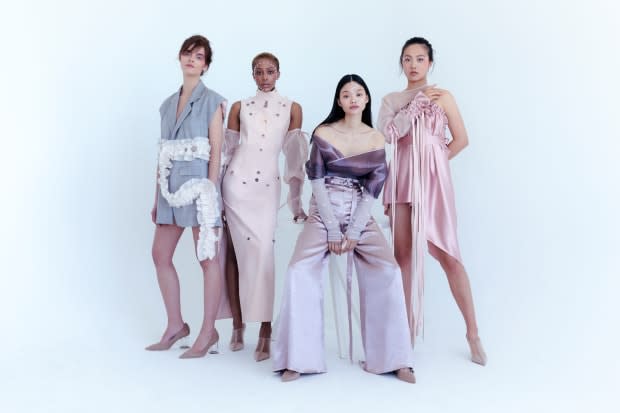
For her thesis, Helena Wang collaborated with Chinese Medicine doctors using acupuncture to address critical women's health issues through fashion. She incorporated balls into garments and accessories, which target specific pressure points to help heal the body. She began by using LinkedIn to find her two collaborators — Jessica Liu and Kai Yim — through a search for Licensed Chinese Medicine Practitioners and Acupuncturists based in New York. "I aim to keep in touch with my ancestors' culture, which is very commonly lost in Asian-American communities in the States," she explains.
"I have seen the women I love most in my life, as well as myself, struggle with certain problems simply because we're women," says Wang. "This is why I created a fashion collection that functionally heals critical women's health issues combined with designs inspired by different forms of power and protection."
Her next step is to try to gain industry experience by working under a designer or brand that shares similar design philosophies as her. She is also considering a master's degree related to business. "Nothing can compare to the feeling of seeing someone feel beautiful and healthy in a garment or accessory I designed," she says.
Natalia Riedel
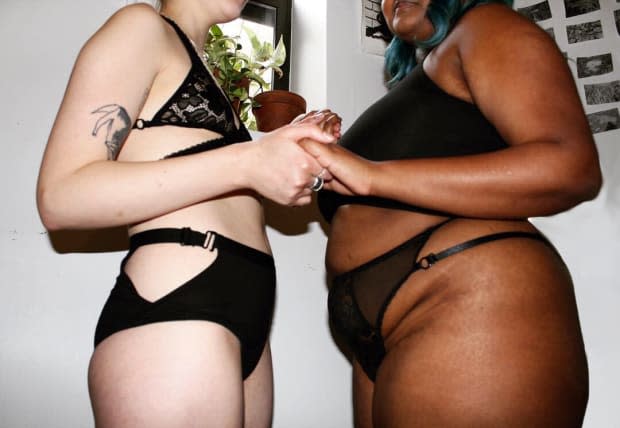
Student Natalia Riedel's thesis is comprised of a community called "These Days," which is devoted to reimagining new entry points for recovery in relation to eating disorders and suicide. By focusing on an area of healing and wellness, she has designed hosiery, tarot cards and body-sensitive intimates with packaging that takes a critical approach to sensitive topics. As for the garments themselves, Riedel exclusively uses low-impact fibers. Her hosiery is also deadstock, sourced from thrift stores and non-profits.
"When I design, it's not about finding a temporary muse but trying to reach real people and to make body-sensitive garments that are based on lived experience," she says. "I am inspired by other people and their stories. I am inspired by all of the women I met in eating disorder treatment, by their lives and their strength, and by the community we built even in the midst of struggling."
As a community, These Days also hosts meet-ups and recovery workshops. Her Instagram account @recoverythesedays serves as a social network to talk about some of the topics she addresses. Riedel plans to expand her project and all digital platforms associated with it to create a wider accessibility.
Sign up for our daily newsletter and get the latest industry news in your inbox every day.
